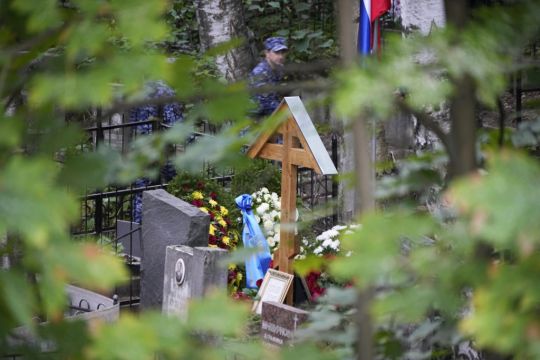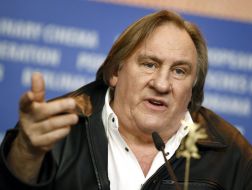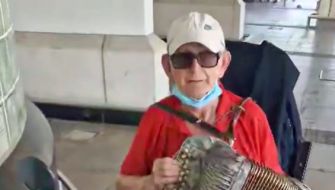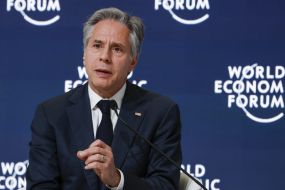A private burial was held for Yevgeny Prigozhin, ending a tumultuous journey from St Petersburg street thug to Kremlin-financed mercenary leader, following a suspicious plane crash two months after his brief mutiny that challenged the authority of President Vladimir Putin.
His spokespeople said on Tuesday that a service took place behind closed doors, and directed “those who wish to bid their farewell” to the 62-year-old head of the Wagner private military contractor to go to the Porokhovskoye cemetery in his home town.
Their statement ended media speculation on where and when Mr Prigozhin would be laid to rest, with his funeral shrouded in secrecy.
A wooden cross towered over his grave covered with flowers and two flags nearby — a Russian tricolor and a black Wagner flag. Russian media cited unidentified sources as saying Mr Prigozhin was laid to rest on Tuesday without any publicity, as per his family’s wishes.
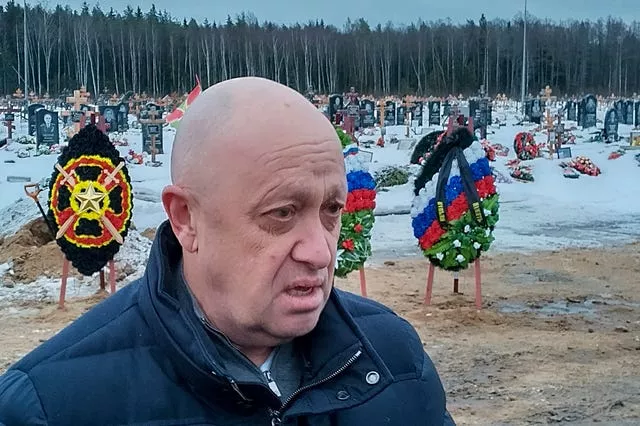
Members of the Russian National Guard stood along the fence at the cemetery, steering visitors away after it closed for the day.
Mr Putin’s spokesman said the president would not attend the service. The Russian leader had decried the armed rebellion in June as “treason” and “a stab in the back”.
The secrecy and confusion surrounding the funeral of Mr Prigozhin and his top lieutenants reflected a dilemma faced by the Kremlin amid swirling speculation that the crash was likely a vendetta for his June 23-24 uprising.
While it tried to avoid any pomp-filled ceremony for him, the Kremlin could not afford to denigrate Mr Prigozhin, who reportedly received Russia’s highest award for leading Wagner forces in Ukraine and was idolised by many of the country’s hawks.
Mr Putin’s comments on Mr Prigozhin’s death reflected that careful stand. He noted last week that Wagner leaders “made a significant contribution” to the fighting in Ukraine and described Mr Prigozhin as a “talented businessman” and “a man of difficult fate” who had “made serious mistakes in life”.
Sergei Markov, a pro-Kremlin political analyst, noted that Mr Prigozhin has become a legendary figure for his supporters who are increasingly critical of the authorities.
“Prigozhin’s funeral raises an issue of communication between the bureaucratic Russian government system that doesn’t have much political potential and politically active patriotic segment of the Russian public,” Mr Markov said.
The country’s top criminal investigation agency, the Investigative Committee, officially confirmed Mr Prigozhin’s death on Sunday.
The committee did not say what might have caused Mr Prigozhin’s business jet to plummet from the sky on August 23, minutes after taking off from Moscow for St Petersburg.

Just before the crash, Mr Prigozhin had reportedly returned from a trip to Africa, where he sought to expand Wagner Group’s activities.
A preliminary U.S. intelligence assessment concluded that an intentional explosion caused the plane to crash, and Western officials have pointed to a long list of Mr Putin’s foes who have been assassinated. The Kremlin rejected Western allegations the president was behind the crash as an “absolute lie.”
Although both were from St Petersburg, Mr Prigozhin and Mr Putin were not known to be particularly close.
Mr Prigozhin, an ex-convict who earned millions and his nickname “Putin’s chef” from lucrative government catering contracts, served Kremlin political interests and helped expand Russia’s clout by sending his mercenaries to Syria, Libya, the Central African Republic and other countries.
Wagner, one of the most capable elements of Moscow’s forces, played a key role in Ukraine where it captured the Ukrainian eastern stronghold of Bakhmut in late May.
The crash came exactly two months after the brutal and profane mercenary boss launched a rebellion against the Russian military leadership. Mr Prigozhin ordered his mercenaries to take over the military headquarters in the southern city of Rostov-on-Don and then began a march on Moscow. They downed several military aircraft, killing more than a dozen pilots.
Mr Putin had vowed to punish the participants but hours later struck a deal that saw Mr Prigozhin ending the mutiny in exchange for amnesty and permission for him and his troops to move to Belarus.
The fate of Wagner, which until recently played a prominent role in Russia’s military campaign in Ukraine and was involved in a number of African and Middle Eastern countries, is uncertain.
Mr Putin said Wagner fighters could sign a contract with the Russian military, move to Belarus or retire from service. Several thousand went to Belarus, where they are in a camp southeast of the capital, Minsk.
Russian state television, which for decades has served as the main source of information for the vast majority of Russians, barely covered the funeral at all.
One major channel, Russia 1, dedicated less than one minute of air time to it in its evening news bulletin, only to say that the funeral ceremony took place “without outsiders and the press at the request of the family” and that Mr Prigozhin’s grave is right next to that of his father, who died in 1978.
Another popular station, Channel One, ignored it completely in their evening news.
